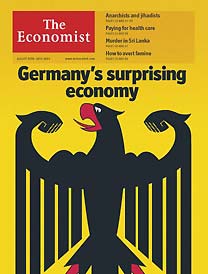Germany in the Muddle of the Middle
From the desk of Paul Belien on Mon, 2005-09-19 12:10

Friedrich Hayek used to warn for “the muddle of the middle.” That, sadly, is the situation Germany will find itself in during the next four years. Last May, when Chancellor Gerhard Schröder called the elections, his socialist SPD stood at barely 28% in the polls while the Christian-Democrat opposition (CDU-CSU) of Angela Merkel polled at 47%. During the campaign Schröder made a comeback, but no-one had expected the final result of 34.3% for the SPD (38.5% in the 2002 elections) and 35.2% for the CDU-CSU (also 38.5% previously). The biggest winner is the post-communist Left Party, which jumped from 4.0 to 8.7% and from 2 to 54 seats in the Bundestag. Germany has definitely shifted to the left.
A center-right coalition of the CDU-CSU with the Liberals of the FDP has become impossible, despite the FDP gains (from 7.4 to 9.8%). A leftist coalition of the Socialists, the Greens (from 8.6 to 8.1%) and the Left Party is theoretically possible, but unlikely. Hence Germany will probably have to settle for a so-called “grand coalition” of CDU-CSU and SPD. Both parties are almosts equally strong, with 217 seats for the Christian-Democrats and 213 for the Socialists, and both Merkel and Schröder have already claimed the position of Chancellor. That will probably go to a Christian-Democrat, but the SPD will demand a high price, including, most likely, the Foreign Ministry. During the campaign the Socialists again (as in 2002) displayed their deep-rooted anti-Americanism. Rolf Schwanitz, one of Schröders senior ministers (who before 1989 used to be an assistant lecturer in law and economics in East Germany – and hence by definition a fellow-traveller of the communist dictators) campaigned with posters showing the coffins of American soldiers killed in Iraq and the slogan “She [Merkel] would have sent soldiers.”

In good shape?
Once again German reunification is to blame for the mess Europe’s most powerful country is in. If there had been no reunification a center-right coalition would have been possible in West Germany. That country could then have taken the lead in the long overdue welfare state reform Western Europe needs and which will not happen anywhere if Germany does not set the good example. If reunification had not taken place East Germany would not have been in a position to vote for unrepentant former communists who want to solve their economic problems at the expense of their Western cousins. If there had been no unification East Germany today would undoubtedly be one of the Central European “tigers” – those booming economies with their considerable liberalisation and their successful flat tax systems.
Today Schröder was able to target Paul Kirchhof, Merkel’s candidate for the Finance Ministry and an outspoken proponent of a flat tax, in a campaign of smear, ridicule and lies, telling voters that a flat tax would lead to a “social bloodbath” and is an unworkable theory – while eleven countries in central and eastern Europe have already succesfully adopted it.
The next four years are bound to be lost years, like the seven previous years under Herr Schröder. As The Economist wrote last week “in practice a grand coalition, led by a Chancellor Merkel weakened by her failure to win a majority, with an embittered SPD many of whose members believe that reform cost them the election, would be unlikely to produce much in the way of change. For Germany’s sake, and for the sake of reform right across the EU, voters should do their best to give Merkel’s Christian Democrats and their [FDP] allies a clear majority.”
The Economist itself, however, played a dubious role during the German electoral campaign by boosting Schröder’s record with a front page article on 19 August claiming that the German economy was in surprisingly good shape. The Schröder government was quick to cash in on this “enlightening compliment.” If Germany, as The Economist wrote in August, is “poised for a rebound,” yesterday’s election result probably does not matter. But remember that it was also The Economist that preferred the “incoherent” John Kerry over the “incompetent” George W. Bush last Fall. Its doublespeak on Germany leads us to wonder what The Economist is: incoherent or incompetent?

No Greens
Submitted by Cogito on Mon, 2005-09-19 22:25.
Angela Merkel hates the greens. She hates the greens! She is one of the too few people who understand where the European Untergang comes from!
german elections
Submitted by Cauwenbergh (not verified) on Mon, 2005-09-19 21:03.
Frau Merkel has inflicted a lasting damage on the CDU : she is not a gifted politician and failed to rally the support of the 'barons' of her party. She barred the most talented young Friedrich Merz. Unable to explain what 'flat tax' really is , she told fairy tales about Mr. Kirchhof nobody was interested in and promised a raise of VAT. The 'Tv Duell' was a disaster. With 50 seats of Die Neue Linke, a leftist coalition may in a short time seal the end of a competitive Germany. So the EU will be a replica of the late Soviet Union
Sorry, Mr. Hayek
Submitted by John Fleming (not verified) on Mon, 2005-09-19 18:58.
I ment 'the muddle of the middle'. Rest In Peace!
Major opportunity!
Submitted by John Fleming (not verified) on Mon, 2005-09-19 16:10.
A leftist coalition is possible, a center right coalition impossible. That's what the people in Germany decided. If Merkel really wants to introduce a new tax system (including a mentality change of course) she should NOT enter a middle of the muddle coalition but use the following 4 years to
change the peoples minds in an honest and open way, and so be prepared to introduce the flat(and far lower) tax system when the current system explodes. She or others will have to speak frankly
about a change in social security system, which obviously goes together with moral changes.
In my opinion, at this stage, there is for the 'old Europe' no possiblity for economic revival witout a painfull rupture with the past. As long as a large majority is not ready for that, you
can forget about flat tax, easy tax, painless tax, what else tax. But we will keep on sinking lower and lower on the scale of world's economic powers. At this stage 'old Europe' prefers
chronical pain instead of major surgery. So far, it still likes the middle of the muddle. So it will be.
The remarkable August front
Submitted by Paul Belien on Mon, 2005-09-19 15:03.
The remarkable August front page article in The Economist, widely reported on in the German media, influenced the German electoral campaign by conveying the message that for an economic rebound a coalition of CDU-CSU and FDP was not absolutely necessary and that a continuation of Schroeders modest reforms might suffice. The German government gladly used the article to make this point, as the links indicate.
I am not as optimistic about the German economy as you (and The Economist) are. The future will tell, but let us hope that you are right, because if Germany is in good shape, the rest of Europe is too.
Try objective
Submitted by Bart Vanhauwaert on Mon, 2005-09-19 14:29.
That the German economy is in better shape than most people admit is a fact. Sure, domestic demand is a huge problem but German companies perform rather well on the international market. Bending the truth to a provoke a wished-for election outcome is the task of politicians, not that of a well respected magazine.
The article in question (your link refers twice to the bundesregierung website, interested readers should try this one ) makes the point that this is rather due to more flexible workers and unions than to the german government. So it is fully consistent with the position of The Economist that a clear win for the CSU-CDU would be the best way to take forward this renewed willingness to be flexible from german workers.